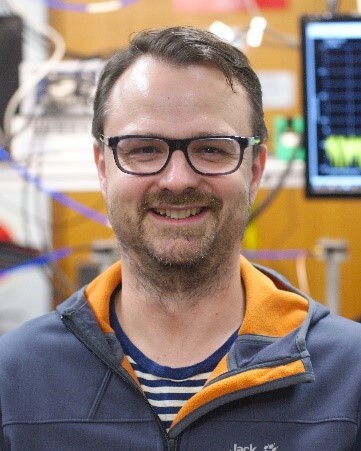The MQV Colloquia feature interdisciplinary talks given by local as well as invited international experts. The colloquia, which are accessible to a worldwide audience via videoconference, cover all aspects of quantum technologies, with a focus on MQV research activities. The goal of the series is to establish and strengthen connections with quantum-technology experts worldwide and to provide a platform for education and scientific exchange for and with the local quantum ecosystem.

"Semiconductor single-photon nonlinearities for photonic quantum technologies"
Thomas Volz – Quandela
Abstract
Semiconductor nanostructures provide a mature platform for creating single-photon non-linearities in the solid state with applications in photonic quantum technologies. In particular, (self-assembled) quantum dots have established themselves as prime candidates for generating high-quality streams of single photons and entangled multi-photon states for quantum computation and communication. In the first part of my talk, I will discuss the ongoing research efforts in the QMAPP group at Macquarie University in Sydney to implement an alternative type of quantum dots, so-called photonic dots. These are based on the effect of polariton blockade in confined cavity-exciton polaritons [1]. The underlying interaction-induced blockade effect mandates strong cavity confinement, ultimately making the implementation of photonic dots a problem of photonic rather than material engineering. This potentially avoids the inhomogeneity and randomness of self-assembled quantum dots. Yet, a key to unlocking the polaritonic non-linearities is the profound understanding of polariton-polariton interactions which are widely debated in the polariton community. Here we introduce a new spectroscopic method that has enabled us to map the interaction landscape for exciton polaritons in great detail and reveal the existence of two-and three-body Feshbach resonances in our GaAs quantum-well sample [2]. Our work paves the way for engineering single-photon non-linearities in polaritonic systems.
The second part of my talk is devoted to the application of self-assembled quantum-dot single-photon sources for photonic quantum computation. A key player in the field is the French startup Quandela, who offers a full-stack, HPC-ready photonic quantum computing solution. In my current role as CTO of Quandela GmbH, a Munich-based subsidiary of Quandela France, I will give an overview of Quandela’s most recent quantum computation platform [3] and highlight important features of its technology, including some ideas for moving forward towards a fault tolerant architecture using Quandela’s generic technology. Finally, I will briefly discuss the plans for Quandela GmbH.
References:
[1] Muñoz-Matutano, G., Wood, A., Johnsson, M. et al. Emergence of quantum correlations from
interacting fibre-cavity polaritons. Nature Mater 18, 213–218 (2019). doi.org/10.1038/s41563-
019-0281-z.
[2] Scarpelli, L., Elouard, C., Johnsson, M. et al. Probing many-body correlations using quantum-cascade
correlation spectroscopy. Nat. Phys. 20, 214–218 (2024). doi.org/10.1038/s41567-023-02322-x.
[3] Maring, N., Fyrillas, A., Pont, M. et al. A versatile single-photon-based quantum computing platform.
Nat. Photon. 18, 603–609 (2024). doi.org/10.1038/s41566-024-01403-4.
Short bio
Professor Thomas Volz is an internationally recognized expert in mesoscopic quantum optics and semiconductor quantum photonics. His main scientific interest is centered around realizing and studying strongly interacting photonic and polaritonic systems. Professor Volz did his PhD in the group of Professor Gerhard Rempe at the Max-Planck-Institute for Quantum Optics, before taking up a postdoc position with Professor Atac Imamoglu at ETH Zurich. Over the past 11 years, Professor Volz has built up and lead the Quantum Materials and Applications (QMAPP) Group at Macquarie University in Sydney, Australia. He was a Chief Investigator, Macquarie University Node Director, and Deputy Director of the Australian Research Council Centre of Excellence for Engineered Quantum Systems, EQUS. He is a Co-founder of Redback Systems, a Sydney-based startup building high-resolution optical spectrometers. Since February 2024, Professor Volz is Managing Director and CTO of the Munich branch of Quandela, the well-known French photonic quantum computing company.
Please join our online colloquium series via Zoom at:
https://eu01web.zoom.us/j/64158654884?pwd=VUZSczcrSXJuaEJzbmJwamN4V0Nvdz09
Meeting ID: 641 5865 4884, Passcode: 823197